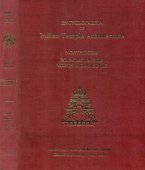Reddi, Reḍḍi: 4 definitions
Introduction:
Reddi means something in the history of ancient India. If you want to know the exact meaning, history, etymology or English translation of this term then check out the descriptions on this page. Add your comment or reference to a book if you want to contribute to this summary article.
India history and geography
Source: Epigraphia Indica Vol. 36: Tenali plates of eastern Chālukya Vijayāditya I grantThe Reḍḍis were the undisputed Telugu rulers of the country and their rule forms a glorious chapter in the history of the Andhra country. That the country had its golden age under these Reḍḍi rulers is clearly borne out from a number of their records and from the literary works of the great Telugu poets such as Śrīnātha and Eṟṟāpregaḍa who were patronised by these rulers. Addaṅki was the captial town of the Reḍḍi rulers according to the verses of the Annavarappāḍu plates of Kāṭaya Vema Reḍḍi.
Source: Project Gutenberg: Castes and Tribes of Southern India, Volume 1Reddi is a sub-division of the Lingayats: a peaceable race of Hindus who acknowledge only one God, Siva, and reject the other two persons of the Hindu Triad. The Reddis are cultivators.
The Lingayats and their sub-divisions (e.g., the Reddis) reverence the Vedas, but disregard the later commentaries on which the Brahmans rely. Their faith purports to be the primitive Hindu faith, cleared of all priestly mysticism. The word Lingayat is the anglicised form of Lingavant, which is the vernacular term commonly used for any member of the community.
Source: Cologne Digital Sanskrit Dictionaries: Indian Epigraphical GlossaryReḍḍi.—(ASLV), a village official. Note: reḍḍi is defined in the “Indian epigraphical glossary” as it can be found on ancient inscriptions commonly written in Sanskrit, Prakrit or Dravidian languages.

The history of India traces the identification of countries, villages, towns and other regions of India, as well as mythology, zoology, royal dynasties, rulers, tribes, local festivities and traditions and regional languages. Ancient India enjoyed religious freedom and encourages the path of Dharma, a concept common to Buddhism, Hinduism, and Jainism.
Languages of India and abroad
Kannada-English dictionary
Source: Alar: Kannada-English corpusReḍḍi (ರೆಡ್ಡಿ):—
1) [noun] a surname among Telugu speaking people.
2) [noun] the chief of a village.
Kannada is a Dravidian language (as opposed to the Indo-European language family) mainly spoken in the southwestern region of India.
See also (Relevant definitions)
Starts with: Reddi-vari-nana-bralu, Reddiapatti, Reddinanabrolu, Reddish-brown terminalia, Reddish-white, Reddivaari nanubalu, Reddivari-nanubalu.
Full-text (+59): Tungabhadra, Kshira, Godavari, Kodla, Guntaka, Tangedu, Gudise, Mungaru, Alla, Nagali, Barrelu, Gorre, Yeddulu, Yenuga, Kanugala, Varige, Mekala, Trilingadesha, Bogolu, Dandu.
Relevant text
Search found 6 books and stories containing Reddi, Reḍḍi; (plurals include: Reddis, Reḍḍis). You can also click to the full overview containing English textual excerpts. Below are direct links for the most relevant articles:
The history of Andhra country (1000 AD - 1500 AD) (by Yashoda Devi)
Part 2 - Asnadevaraja (A.D. 1385) < [Chapter XV - The Nagas]
Part 11 - End of the Kona Haihaya dynasty < [Chapter II - The Haihayas]
Part 5 - Jayanta II and Jayantikaraju (A.D. 1292-1356) < [Chapter XIII - The Dynasties in South Kalinga]
Leaders and Landmarks of Telugu Literature < [Aug - Sept 1939]
The People of Andhra Pradesh and Their Heritage < [July – September 1973]
The Reddis and the Rayas - A Page from Deccan History < [November-December 1933]
Later Chola Temples (by S. R. Balasubrahmanyam)
Temples in Tummuru < [Chapter XIV - Temples of Rajaraja III’s Time]
The backdrop of the Srikanthacarita and the Mankhakosa (by Dhrubajit Sarma)
Middle Chola Temples (by S. R. Balasubrahmanyam)
Temples in Gangaikondasolapuram (Gangaikondacholapuram) < [Chapter IV - Temples of Rajendra I’s Time]
Amaravati Art in the Context of Andhra Archaeology (by Sreyashi Ray chowdhuri)
Lower Kṛṣṇā Valley (1): Amarāvatī < [Chapter 2 - Amarāvatī and other Archaeological Sites of Ancient Andhra Pradesh]
Related products
